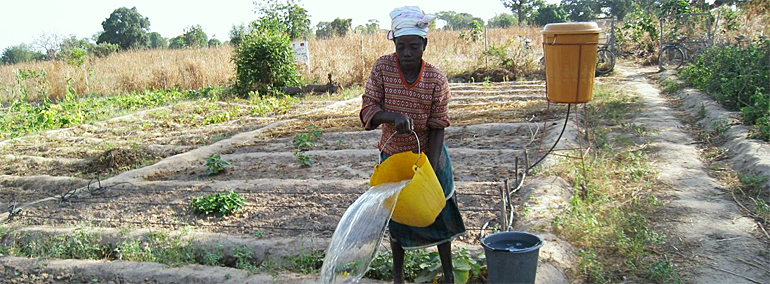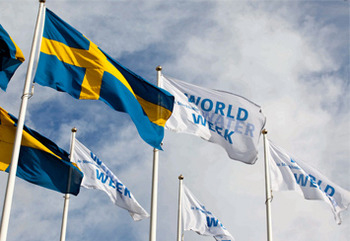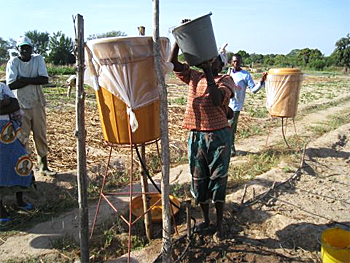Stockholm water week: Unesco-IHE puts drip irrigation in perspective
 Unesco-IHE researchers have been involved in various research projects about drip irrigation. At the World Water Week, to be held in Stockholm from 31 August to 5 September 2014, they will present their findings.
Unesco-IHE researchers have been involved in various research projects about drip irrigation. At the World Water Week, to be held in Stockholm from 31 August to 5 September 2014, they will present their findings.
Drip irrigation is widely promoted as an innovative technology to address current water, food, poverty, and environmental challenges. It is spreading among agro-entrepreneurs and smallholders in many countries, but it is not a miracle solution to water scarcity, food insecurity, and poverty.
 Wakeup call
Wakeup call
The main buyers of drip irrigation kits appear to be development NGO's rather than the farmers themselves. Once the development project has ended, motivation to continue with drip irrigation seems lacking.
According to professor Margreet Zwarteveen at UNESCO-IHE a wakeup call is needed when discussing the success of low-cost drip kits.
Zwarteveen will be one of the panelists at the seminar 'Putting Drip Irrigation in Perspective: Reality Check on the Promises of a Technology' on Thursday 4 September.
Lack of interest by farmers
"In Sub-Sahara Africa, enthusiasm for drip kits mainly comes from manufacturers, funders and development organizations", writes Zwarteveen in a recent article on the Unseco-IHE website. "Apparently, kits feed into a wide-spread desire in the development aid community for believing in the existence of neat and small-scale technical solutions to structural problems of poverty and resource depletion."
 Zwarteveen continues: "The idea that a simple and cheap technical device can help Africa's farmers become profit-making entrepreneurs is indeed appealing and therefore effective for fund-raising purposes. Yet, unless farmers themselves actively engage with new technological solutions there is little hope that these will have a longer-lasting impact."
Zwarteveen continues: "The idea that a simple and cheap technical device can help Africa's farmers become profit-making entrepreneurs is indeed appealing and therefore effective for fund-raising purposes. Yet, unless farmers themselves actively engage with new technological solutions there is little hope that these will have a longer-lasting impact."
Renewed assessment
The seminar on drip irrigation at the Stockholm Water Week will provide a renewed assessment of the potential and performance of drip irrigation worldwide, in terms of water, food, poverty and environment.
Four transversal themes will be discussed:
● smallholder drip irrigation systems and support mechanisms for their sustainable dissemination and use;
● approaches enhancing coherence between farmer-led technical change and irrigation system-level modernization;
● the multiplicity of systems for multiple farmers;
● drip irrigation standards and subsidies mechanisms.
The seminar is one of the 100 events during the Stockholm Water Week and is co-organised by Institut de Recherche pour le Developpement and Wageningen University.
(photos of drip installation Burkino Faso: Jonas Wanvoeke, PhD Fellow at Wageningen University and Unesco-IHE)
Also read on this website
• Stockholm Water Week: Photo coverage highlighting some remarkable Dutch contributions, 8 September 2014
• Stockholm Water Week: Joint water-energy supplies in poor areas not as obvious as it seems, 8 September 2014
• Stockholm Water Week: Rainwater management crucial for eradication global poverty, 4 September 2014
• Stockholm Water Week: Seven Dutch winners in cutting edge technology challenge on water and food, 3 September 2014
• Stockholm Water Week: Yes, access to clean drinking water for all, but how?, 2 September 2014
• Stockholm Water Week: Teaming up with energy service deliveries makes sense in world's poor places, 29 August 2014
• Dutch buzzword at Stockholm water week will be sustainable water services, 22 August 2014
More information
Unesco-IHE article
A Wakeup Call from the Drip Dream, article by Margreet Zwarteveen & Ewoud Kok, Unesco-IHE, published 19 August 2014
Stockholm Water Week programme, 4 September 2014
Putting Drip Irrigation in Perspective: Reality Check on the Promises of a Technology, 4 September 2014



